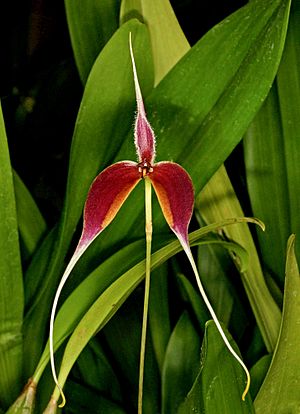Red horntail orchid facts for kids
Quick facts for kids Red horntail orchid |
|
|---|---|
 |
|
| Scientific classification | |
| Genus: |
Bulbophyllum
|
| Species: |
maxillare
|
| Synonyms | |
|
|
The Bulbophyllum maxillare, also known as the red horntail orchid, is a special type of orchid. It's called an epiphyte, which means it grows on other plants, like trees, but it doesn't harm them. This orchid has unique reddish flowers with yellow or white edges. You can find it growing on the lower branches of rainforest trees in places like India, New Guinea, and tropical North Queensland in Australia.
Contents
What the Red Horntail Orchid Looks Like
The red horntail orchid is a plant that grows on trees. It has a creeping stem called a rhizome that helps it spread. Along this stem, there are special swollen parts called pseudobulbs. These pseudobulbs are dark green to yellowish, about 15–40 mm (0.6–2 in) long and 8–12 mm (0.31–0.47 in) wide.
Each pseudobulb has one large, thin leaf. These leaves are dark green to yellowish and shaped like an ellipse or a spear. They are about 80–150 mm (3–6 in) long and 15–25 mm (0.59–0.98 in) wide, with a short stalk.
The Flowers of the Orchid
A single flower grows on a thin stem that can be 100–200 mm (3.9–7.9 in) long. The flower itself is quite large, about 60–90 mm (2–4 in) long and 20–25 mm (0.79–0.98 in) wide. It is usually reddish to purplish with bright yellow or white edges.
Orchid flowers have special parts:
- The dorsal sepal (the top leaf-like part) is oblong or spear-shaped. It's 20–35 mm (0.79–1.4 in) long and 3–4 mm (0.12–0.16 in) wide, with tiny hairs on its edges.
- The lateral sepals (the side leaf-like parts) are much bigger. They are egg-shaped or spear-shaped, 35–80 mm (1.4–3.1 in) long and 5–7 mm (0.20–0.28 in) wide. They also have a thin "tail" that is another 20–30 mm (0.79–1.2 in) long.
- The petals are curved and form a hood over the central part of the flower called the column. They are 4–7 mm (0.16–0.28 in) long and about 2 mm (0.079 in) wide.
- The labellum (a special lip-like petal) is purple and yellow. It's 5–7 mm (0.20–0.28 in) long and about 2 mm (0.08 in) wide, with a thin tip.
In Australia, these orchids usually bloom between July and October.
How the Orchid Got Its Name
The red horntail orchid was first officially described in 1843 by a botanist named John Lindley. He gave it the scientific name Cirrhopetalum maxillare. Later, in 1861, another botanist named Heinrich Gustav Reichenbach changed its name to Bulbophyllum maxillare, which is the name it still has today.
Where the Red Horntail Orchid Lives
The Bulbophyllum maxillare orchid grows on the lower parts of tree trunks and branches in rainforests. You can find it in many different places around the world, including:
- The Andaman and Nicobar Islands
- The Malay Peninsula
- Borneo
- Java
- The Philippines
- Sulawesi
- Sumatra
- The Solomon Islands
- New Guinea
In Australia, it grows on Moa Island, near Shelburne Bay (close to Cape Grenville), and near the Rocky River.
See also
 In Spanish: Bulbophyllum maxillare para niños
In Spanish: Bulbophyllum maxillare para niños

